School’s Out For Skiing
In many Vermont ski towns, skiing and riding is all part of the curriculum. But for one farming community, it took a village to make sure its kids learned to ski.
BY EMMA COTTON AND ABAGAEL GILES
On a snowy Friday in early March, Orwell Village School sixth-grader Jacob Clifford sits on a chairlift at Pico Mountain in Mendon. Normally, he’d be in math class at around this time, but on this day he’s mastering a jump in the terrain park.
Math is Clifford’s favorite subject, but when asked if he’d rather be skiing, he flashes a toothy smile and nods.
For the students at Orwell Village School, which is located in the rolling farmlands of far western Vermont, Fridays for the last three winters have been good days. At 10 a.m., while most other kids their age around the country are writing papers and balancing equations, all 120 of the Orwell youngsters file out of their classrooms and grab seats on three big yellow school buses. The buses take off, charging through the snow-covered hills, and arrive at Pico an hour later. The rest of the day is devoted to skiing.
The hours off count as physical education time and the cost to students is minimal.
VERMONT’S TRADITION OF SKI P.E.
To Vermonters, a school-run ski program might not seem special. Ski Vermont’s Fifth Grade Passport program gives 88 days of free skiing to fifth graders at any Vermont school and many schools all over the state dedicate a weekday to on-mountain learning, or provide free season passes to students who make the honor roll. These opportunities are especially common in mountain towns and at ski areas such as Bolton Valley, Mad River Glen and Stowe, school ski programs have been going on for more than 50 years.
Bolton Valley’s founder, Ralph DesLauriers first launched a kids’ after-school program in 1966, the same year the ski area opened, because he noticed that Vermont’s ski slopes were mostly populated by out-of-state skiers. “I’d say we’ve taught easily over 10,000 Vermont kids to ski over the years, if not more. It fits right in after school. Kids get on a bus to go to the mountain, take a lesson, ski with their friends, then their parents can pick them up after work,” says Josh Arneson, who has been Bolton’s communication director. Bolton Valley currently has 21 schools participating in its after-school ski program, with 1,700 kids enrolled over two semesters for the 2018-2019 season
“The rising cost of skiing makes it difficult for some kids to have access to the sport,” says Mad River Glen general manager Matt Lillard. That’s why Mad River Glen hosts local schools from Calais, Fayston, Moretown and Waitsfield for in-school ski programs and has since the 1950s. For the last 20 years, the ski area has offered free season passes to kids under the age of 12.
This year, Mad River Glen received a $15,000 grant from the Reed Family Foundation to fund its Skiing For Scholars Program, which offers free skiing and lessons to local public school students. Lillard says the grant will expand the existing free skiing programs Mad River offers elementary school students to include middle and high school students in the Mount Abraham and Washington West School Districts. In addition to free skiing, students get free instruction from race coaches and rentals.
For eight Fridays during the winter, all students in Stowe’s public school system break from their regular schedule and participate in alpine skiing and snowboarding (or other activities). A $60 pass gets them skiing those Fridays, as well as on school holidays, snow days and during February break.
Stowe’s program is powered entirely by volunteer chaperones who guide kids around the mountain, get them on the right buses and keep an eye on them in the lodge. “It’s the one time kids can be with adults who aren’t their parents or teachers or in ski school. They don’t have to learn; they just get to ski with their friends,” says Vanessa Violette, herself a volunteer and organizer. Volunteers get a nontransferable ticket voucher to Stowe for every two days of on-snow instruction.
John “J.G.” Gerndt has volunteered for Stowe’s Friday Ski program for the last three seasons. Gerndt was one of the first sponsored Burton athletes in the mid-1980s and is one of their most celebrated board designers. He’s also the dad of a fourth grader.
“Not every kid in the Stowe school system has access to the right equipment,” says Gerndt, and the kids
are required to provide their own if they want to participate in the program. “Sometimes I’ve seen kids with gear that’s holding them back. I’ve been lucky to be able to contact their parents to say, ‘Hey, I’ve got access to this equipment and I can lend it to your child. Would you be comfortable with that?’ In many cases, we can let those kids keep it,” says Gerndt.
According to Violette, Stowe’s Pinnacle Ski and Sports has also helped provide equipment at little (or occasionally no) cost. “They never single out the kids who need it but they know and the bill just never comes,” says Violette.
Burton allows Gerndt to volunteer his time and he’s “coached” the same group of eight- to ten-year-olds for the last couple of years. He’s seen them grow, on and off the slopes.
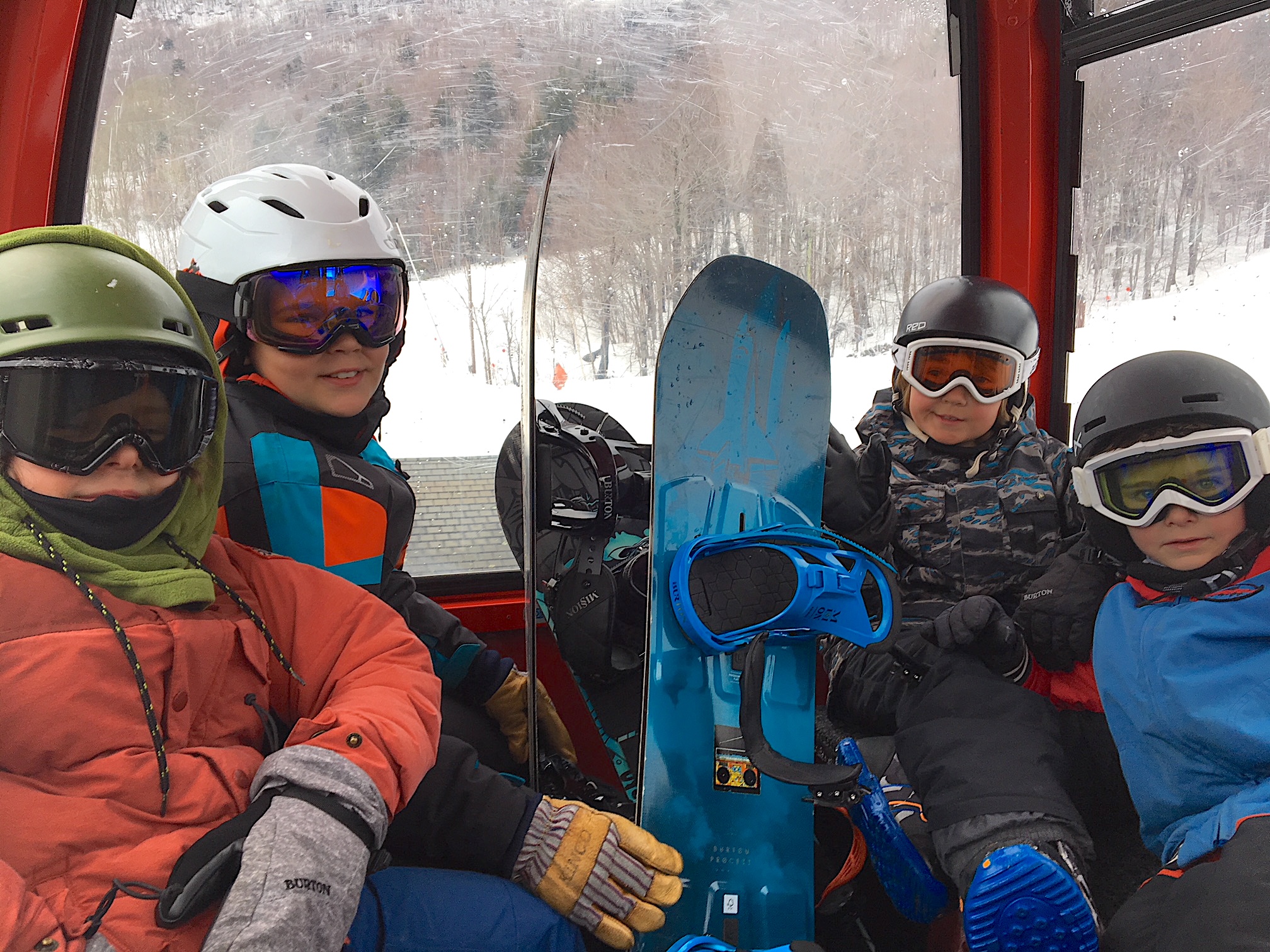
One of his kids had been having trouble at school. “He really got a lot out of snowboarding but didn’t have a pass or anyone to take him on the weekends,” recalled Gerndt, who said the Friday Program was one place the student could really excel. “With snowboarding, he was really great at listening to pointers and tips. Now, if I see him around school, he’ll come over and say hello to me. I got to see him grow up a bit and his behavior is improved. It seemed like he really learned to be respectful of me and of the mountain and his classmates.”
Although many of the chaperones are parents, Gerndt sees a lot of twenty-somethings who volunteer. “There are a lot of really good riders who came through the program and stayed in the valley.”
THE LITTLE TOWN THAT COULD
Orwell is a dairy farming community of 1,234 people that lies about 20 miles west of the Green Mountains. Getting the ski program started there required a massive fundraising effort, says Stefanie Wilbur, who spearheaded the program. “Orwell is beautiful, it’s vast, it’s far from everything. It’s 30 minutes to the grocery store, and we love that.”
Wilbur, a mother of three, runs a dairy farm, one of about 10 remaining in Orwell. “We are not a skiing community and to open these kids up to that is just awesome,” she says. For Orwell parents and teachers, watching the kids carve turns every Friday feels like a small miracle.
Wilbur first pitched the idea of a Friday ski program to the school board in 2015. She had already called around to ski resorts to see which program was most feasible. She found Pico, whose Junior Explorers program included a 90-minute lesson, a lift ticket and rentals for $10 per child per day—$60 per child for the program’s six weeks.
In total, with busing, Wilbur figured the program would cost $11,000 per year. The school board said she could do it, as long as she could raise the money.
That was in November of 2015. By Christmas, the money was raised. By February, at no cost to families,
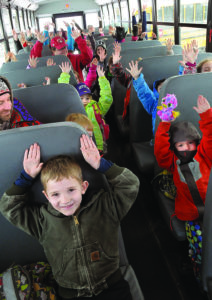
the kids were on the mountain.
“I called everybody I knew,” Wilbur said with a laugh. Every cousin, every uncle, every co-worker, any business, I just cold-called. The First National Bank of Orwell made a very large, generous donation. Stonewood Farms made a large donation. But other than those two, they were anywhere from $5 to $60,” she said.
“All you have to say is, ‘I want to get kids skiing,’ and they’re like ‘absolutely, how can I help?’” Wilbur continued. “It’s pretty awesome.”
The program’s first year was a success. Almost every student in the school, kindergarteners through eighth-graders, skied, and those who didn’t traveled to the mountain anyway and did homework with chaperones in the lodge. The teachers came on alternating Fridays.
For the 2017 spending year, the Orwell School Board decided to help fund the program. They covered $4,000—the cost of transportation. For the remaining $7,000, the newfound Booster Club got creative. They started a now-annual golf tournament, and they auctioned off Adirondack chairs that the kids painted. Those fundraisers now bring in plenty of money, which the club uses to supply neck warmers and snacks to kids at the mountain.
For the 2017-2018 school year, the town voted to include the entirety of the program’s cost in the school budget. And on Town Meeting Day in 2018, residents voted yet again to fund the program for 2018-2019.
It’s that support from communities that keeps public school kids skiing across the state. “For some kids, this is their only access,” says Violette.
Since Vail Resorts bought Stowe in 2017, chaperones have had to work two days to earn a non-transferable lift ticket (previously they earned a lift ticket for the day they volunteered and one to share for another date after just one day of work). Violette says the number of chaperones has declined, in part because there is no reward for season passholders.
Several local companies like Keurig and Burton allow their employees to volunteer on the clock. Gerndt says the chaperones get a lot out of the program too. “I’ll probably keep volunteering even after my son is done with the program,” he says. “It’s just a lot of fun. I look forward to it every week and I know the kids do.”

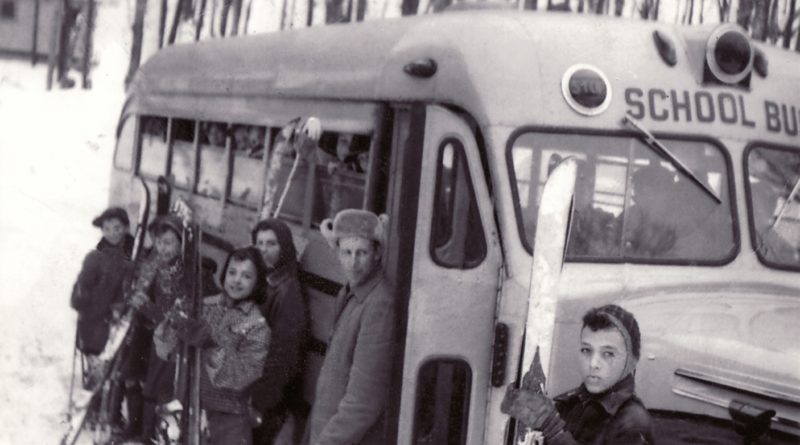
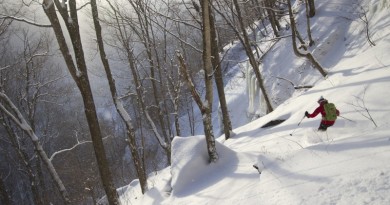
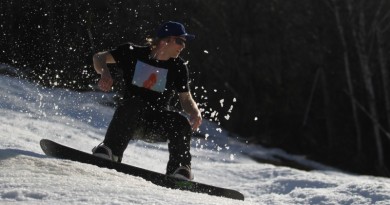
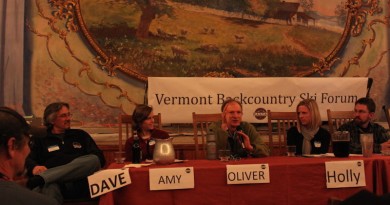
This vintage school bus image was taken at Mad River Glen in the 1960’s. The man in the fur hat is the bus driver, Willis Armstrong who was also took ski lessons with the kids. Liability laws wouldn’t allow that today!
That’s awesome caption material. Thank you Eric!
Thanks for a wonderful article about a very important program.
Pingback: Vail reverses ski program rate hike for kids on Fed lunch list | Tera News